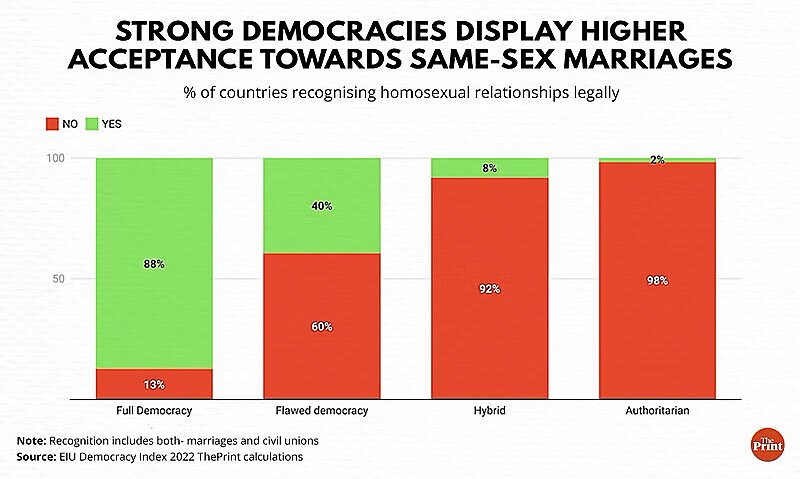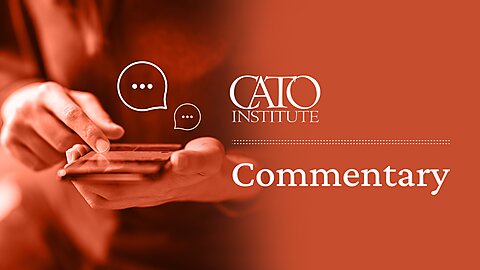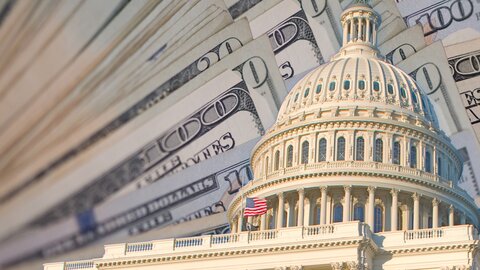
Democracies, Autocracies, and Same‐Sex Unions
A new study by the Indian newspaper The Print, based on data from The Economist Intelligence Unit’s Democracy Index 2022, finds that 88 percent of full democracies recognize same‐sex marriages or civil unions, while only 2 percent of authoritarian regimes do.
As my colleague Swaminathan Aiyar told the paper, “Autocracies do not recognise individual rights as fundamental and inalienable. Autocracies are organised on principles that allow the autocrat to discriminate on any grounds. In such countries, the progress of same‐sex rights will naturally be slower or non‐existent.” By contrast, implementation of same‐sex marriage in democratic countries proceeded very rapidly once it became a matter for debate. In 1989 Denmark became the first country in the world to legally recognize same‐sex unions, in the form of “registered partnerships.” In 2001 the first same‐sex marriage law came into effect, in the Netherlands.
In a sense this finding isn’t very surprising, of course: Liberal countries tend to be liberal. I’ve written about this before, citing a column written in 2013 by the British journalist Michael Hanlon. Hanlon wrote about a “morality gap” in the world that could be seen most clearly in attitudes toward gay rights. His column is worth quoting at length:
It is now clear, though not much talked about, that humanity, all 7.1 billion of us, tends to fall into one of two distinct camps. On the one side are those who buy into the whole post‐Enlightenment human rights revolution. For them the moral trajectory of the last 300 years is clear: once we were brutal savages; in a few decades, the whole planet will basically be Denmark, ruled by the shades of Mandela and Shami Chakrabarti.
And there’s some truth in this trajectory — except for the fact that it only applies to half the planet. The other half resolutely follows a different moral code: might is right, all men were not created equal and there is a right and a wrong form of sexual orientation.…
Let’s start with attitudes to gays, not because gay rights are the most important issue, but because attitudes to homosexuality show the morality gap in sharpest relief.…
A look at the timeline of gay rights shows a seemingly unstoppable barrage of permissiveness, with state after state passing laws first legalising homosexuality, then going further: permitting gay marriage and gay adoption and formalising gay relationships in terms of pensions and property rights. It’s tempting for those of us in this enlightened half of the world to think of this as a great wave of progress that rose up in the mid‐20th century and will sweep across the world.
Tempting, but wrong. In fact, in much of the world, received wisdom on homosexuality appears to be going into reverse.
Of course, this divide in the world is well known. It’s been discussed and analyzed in Pew Research studies, examined at HumanProgress.org, and included in the rankings of the Human Freedom Index. The findings from The Print show the divide in stark relief.
Liberalism is the most successful idea in the history of the world, yet it is now under attack in many parts of the world. Not just in countries such as Russia, China, Uganda, and India, but in liberal and democratic countries as well. Ideas we thought were dead are back. Socialism, protectionism, ethnic nationalism, antisemitism, even — for God’s sake — industrial policy. Liberals must sharpen their arguments and redouble their advocacy efforts on behalf of individual rights, free markets, limited government, and peace. Or as I like to say, we must continue to extend the promises of the Declaration of Independence — life, liberty, and the pursuit of happiness — to places, and people, and aspects of life they have not yet reached.



